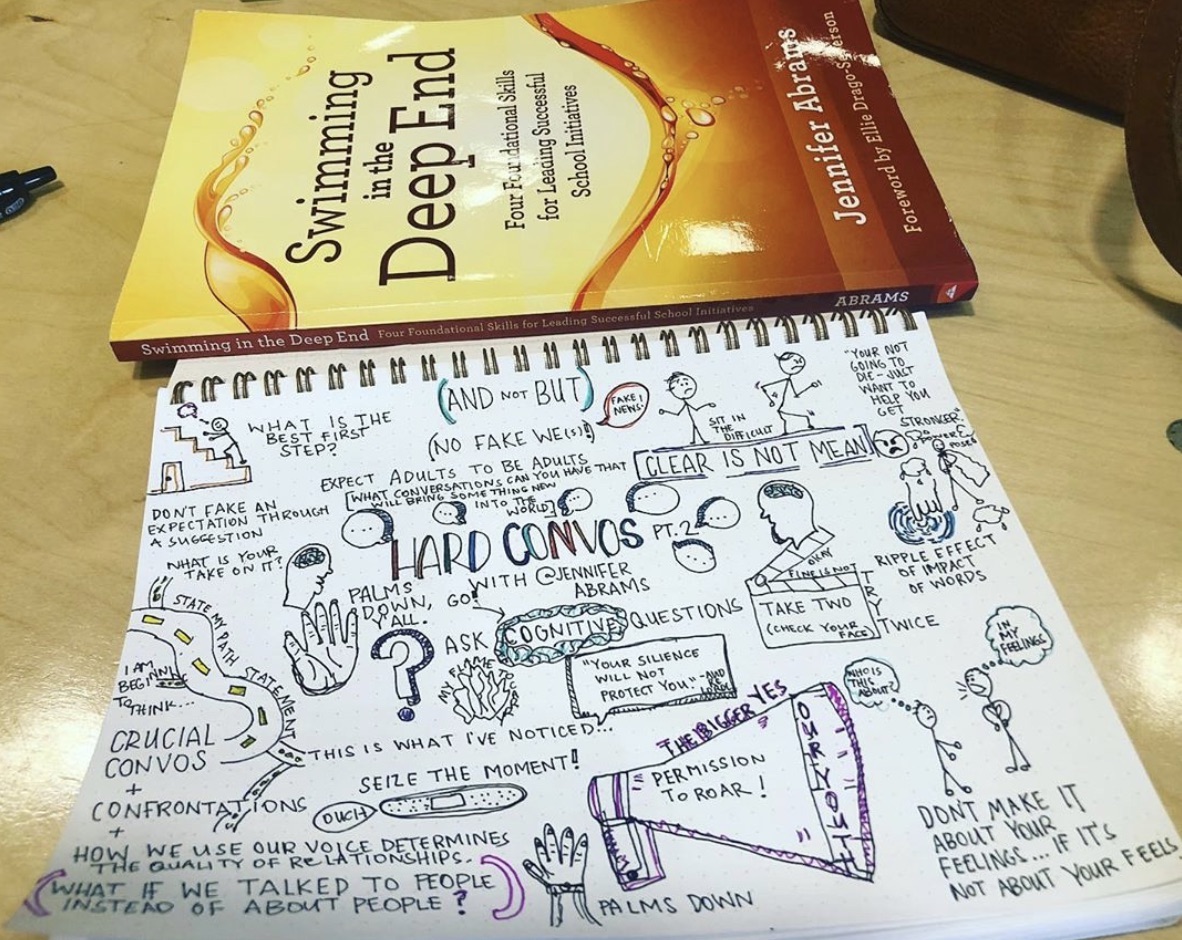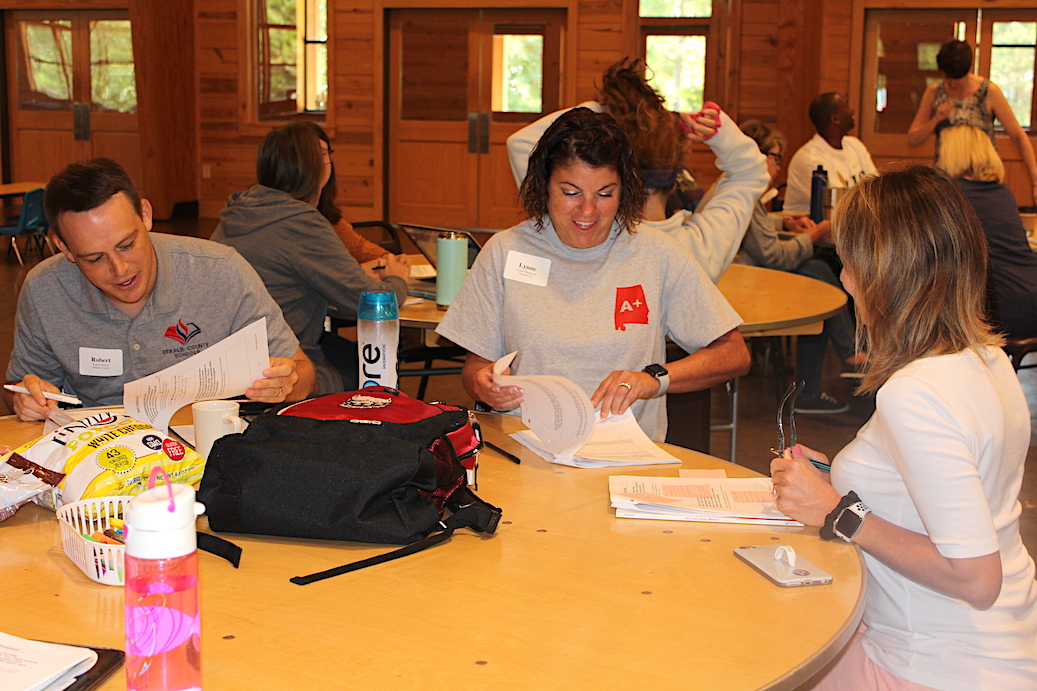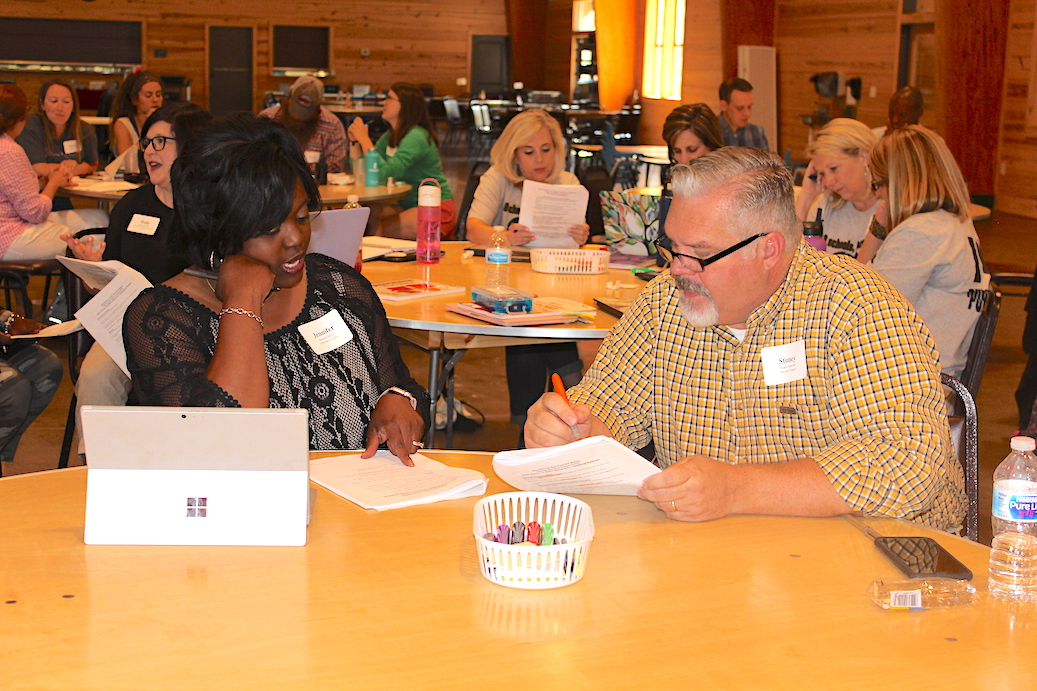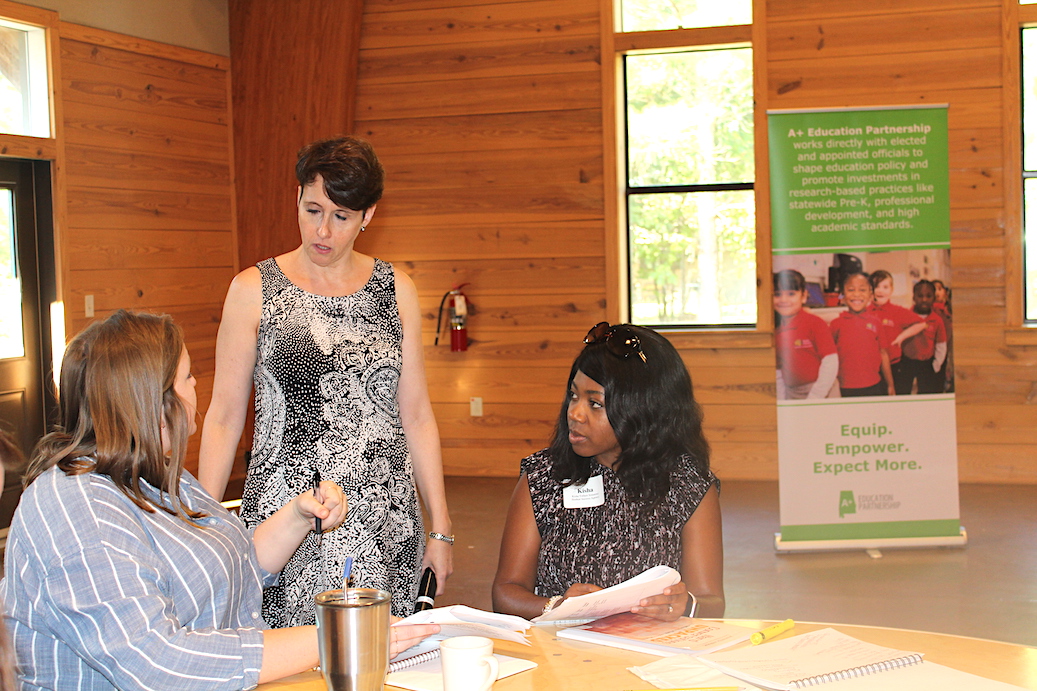 Early last week, instructional leaders and partners from across Alabama gathered at Camp McDowell for the Alabama Best Practices Center’s Hard Conversations Institute with former English teacher, new-teacher coach and bestselling leadership author Jennifer Abrams.
Early last week, instructional leaders and partners from across Alabama gathered at Camp McDowell for the Alabama Best Practices Center’s Hard Conversations Institute with former English teacher, new-teacher coach and bestselling leadership author Jennifer Abrams.
The two-day session was led by Abrams, whose latest title Swimming in the Deep End: Four Foundational Skills for Leading Successful School Initiatives (Solution Tree) was published in April.
 Jennifer’s first book, Having Hard Conversations (Corwin, 2009), provided a step-by-step approach to mastering the art of challenging conversations in a wide range of professional situations. Her next (intriguing!) title, also from Corwin, appeared in 2013: Being Generationally Savvy: Working Effectively with Educators of All Generations. Jennifer extended her thinking and her practical support for professional coaching in Hard Conversations Unpacked: The Whos, the Whens, and the What-Ifs (Corwin, 2016).
Jennifer’s first book, Having Hard Conversations (Corwin, 2009), provided a step-by-step approach to mastering the art of challenging conversations in a wide range of professional situations. Her next (intriguing!) title, also from Corwin, appeared in 2013: Being Generationally Savvy: Working Effectively with Educators of All Generations. Jennifer extended her thinking and her practical support for professional coaching in Hard Conversations Unpacked: The Whos, the Whens, and the What-Ifs (Corwin, 2016).
In a time when the teacher workforce is rapidly evolving and schools are under great pressure to strengthen their systems for professional learning and collaboration, we couldn’t imagine better topics for a learning “retreat.”
How did it go? I’d like to answer that question in two ways: first, some tweets from participants — and then a BuzzFeed style “listcicle” from education innovation (and ABPC) consultant Beth Sanders. For good measure, we’ve even included some of Beth’s sketchnotes!
Learning so much from @jenniferabrams @al_bpc institute on “Having Hard Conversations w/a Touch of Generational Savvy” #alpartners pic.twitter.com/7cCpykixIK
— Jackie Walsh (@Question2Think) September 16, 2019
IPs enjoying our day of learning about “Hard” Conversations! @fhsfalcons1 @FFCSoar @WeedenElem @FlorenceMiddle @jcbutler22 @al_bpc @JackieAFlowers pic.twitter.com/J1l4MV5bkW
— Zachary Searels (@ZacharySearels) September 16, 2019
Enjoying listening to @jenniferabrams with @al_bpc Learning so much about having hard conversations in my instructional coaching. #edtech #education #instructionalcoach pic.twitter.com/8mRYjkX4jI
— 𝔸𝕓𝕓𝕖𝕪 (@mrstechpig) September 17, 2019
https://twitter.com/WesGordonPDGuy/status/1173959204274655232
What a great two days at w/ AL educators and some of my favs— @MsSandersEdu, @alysoncarp1, @Question2Think, @cathygassenheim !!! 🥰❤️
Coaching: Multigenerational Conflicts & More w/ @jenniferabrams — author of #HardConversationsUnpacked #ALPartners @al_bpc pic.twitter.com/yllq0qtnDA
— Dr. Kisha “PhDMom” Tolbert, NBCT (@DrKisha_PhDMom) September 17, 2019
Awesome learning about #HardConversations at Coaching Challenges with @jenniferabrams. Thanks to @al_bpc for sponsoring this event @CampMcD. #ALPartners pic.twitter.com/WQr4vGK81V
— Tammy Embry (@tammy_embry) September 17, 2019
Had the best experience for the last 2 days with @jenniferabrams at Camp Mac with @al_bpc ! Then I returned to find this thank you note on my windshield from my awesome superintendent! @cristenpherring #powerfulconversations #hardconversations pic.twitter.com/bIT4NcKRua
— Debbie Brooks (@DABrooks94) September 18, 2019
Beth Sanders: 10 Takeaways from the Hard Conversations Institute
Here’s some of what we learned from Jennifer Abrams…
One. Our conversations invent us. It is our collective responsibility to have hard conversations — and how we use our voice determines the quality of our relationships.
Two. Clarity is kind and it’s critical to be exact with expectations. Clarity always overrides accountability. Expect adults to be adults and approach dialogue in a humane and growth producing way. Talk to people, not about people.
Three. Don’t frame an expectation as a suggestion or use “we” as a part of the solution when you don’t mean it. Keep your feelings out of it – don’t make it about your feelings if it’s not about your feelings.
Four. Keep your palms down when you’re having a hard conversation with someone. Flailing arms and hands up in the air won’t help anything.
Five. We are living and leading in the most diverse and interconnected world in history and awareness of multi-generational differences and potential conflicts is important as we approach and achieve success in difficult conversations.
Six. Characteristics, needs, skill sets, and defining moments vary greatly from Traditionalists to Millennials. The more we know about and value our differences – not just generationally, but also culturally – the more likely we will be able to have successful difficult conversations.
Seven. An allocentric perspective focuses on the other, rather than the I. If we are able to center our attention and actions on other people, rather than just ourselves, we are much more likely to not take things personally that aren’t personal and maintain our focus on the topic and goal of the discussion.
Eight. Take the time to map out the outcome you’re working towards prior to having the hard conversation. Name the problem clearly, articulate the solution concretely, keep the focus on repeatable behaviors and make sure the person knows the knowledge and skills they need to be successful. Pre-plan specific strategies and resources needed to provide personalized support to the person in order to have a successful hard conversation and achieve your outcome.
Nine. Hard conversations aren’t just between 2 people, sometimes we need to have them with ourselves. Ask yourself what you might need to learn or relearn, what personal support you might need, and tap into your own thoughts and emotions to ensure your conversation is the most effective it can be – prior to having it. Be sure to reflect after as well.
Ten. Wait time matters. Keep it short and clear. Apologies and excusing on your part won’t help the person – being quiet and providing a space for them to speak will. The truth of it all isn’t a problem, it is an opportunity to create a solution. Use your voice to affect change by addressing negative, untrue, uncomfortable, or unkind comments.
Thanks to Beth, Jennifer, and all the school leaders who made it possible for their staff to participate in these amazing two days!
Cathy Gassenheimer is Executive Vice President of the A+ Alabama Best Practices Center.







0 Comments on "10 Takeaways from ABPC’s Hard Conversations Institute with Jennifer Abrams"